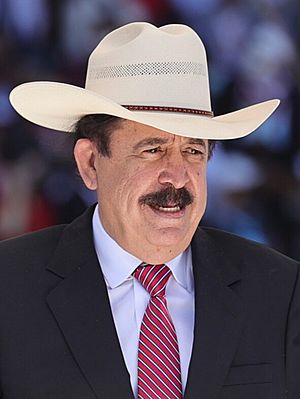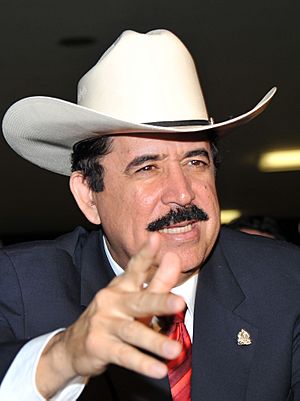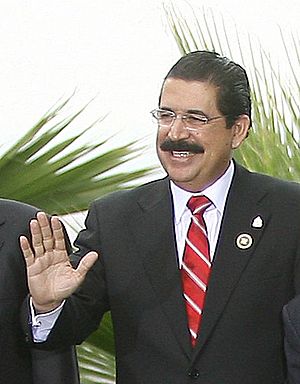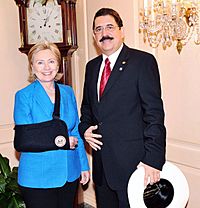Manuel Zelaya facts for kids
Quick facts for kids
Manuel Zelaya
|
|
|---|---|

Zelaya at his wife's presidential inauguration in 2022.
|
|
| First Gentleman of Honduras | |
| Assumed role 27 January 2022 |
|
| President | Xiomara Castro |
| Preceded by | Ana García Carías (as First Lady) |
| 35th President of Honduras | |
| In office 27 January 2006 – 28 June 2009 |
|
| Vice President |
|
| Preceded by | Ricardo Maduro |
| Succeeded by | Roberto Micheletti (interim) |
| Leader of Libre | |
| Assumed office 26 June 2011 |
|
| Preceded by | Party established |
| Deputy of the Olancho Department | |
| In office 25 January 2014 – 25 January 2018 |
|
| In office 25 January 1986 – 25 January 1998 |
|
| Personal details | |
| Born |
José Manuel Zelaya Rosales
20 September 1952 Catacamas, Olancho, Honduras |
| Political party | Liberal Party (1970–2011) LIBRE (2011–present) |
| Spouse | |
| Children | 4 (including Xiomara) |
| Alma mater | National Autonomous University of Honduras (Incomplete) |
José Manuel Zelaya Rosales (born September 20, 1952) is a politician from Honduras. He was the 35th president of Honduras from 2006 until 2009. In 2009, he was removed from power by the military in a coup d'état. Since January 2022, he has served as the first-ever First Gentleman of Honduras.
Zelaya is the oldest son of a rich businessman and was given his father's nickname, Mel. Before he became a politician, he worked in his family's logging and timber businesses.
He was elected president as a member of the Liberal Party. During his presidency, he made alliances with other left-leaning leaders in Latin America. On June 28, 2009, the military arrested him and sent him to Costa Rica. This event is known as the 2009 Honduran coup d'état.
In September 2009, he secretly returned to Honduras and stayed in the Brazilian embassy in the capital city, Tegucigalpa. In 2010, he left for the Dominican Republic and lived there for over a year.
Zelaya is married to Xiomara Castro, who is the current President of Honduras. When she became president in 2022, Zelaya became the first "First Gentleman" in the history of Honduras.
Contents
Early Life and Family
Zelaya was born in Juticalpa, Olancho, as the oldest of four children. He attended elementary school and high school in Honduras. He started studying civil engineering at a university but left in 1976 to focus on his family's farming and forestry businesses.
His father, José Manuel Zelaya Ordoñez, was arrested in connection with a violent event in 1975. Because of this, Manuel Zelaya had to take over the family business. His father was later pardoned by the head of state.
Zelaya became a successful landowner and businessman. In 1987, he became a manager for two important business groups in Honduras, the Honduran Council of Private Enterprise (COHEP) and the National Association of Wood Processing Enterprises.
Starting a Career in Politics
Zelaya joined the Liberal Party of Honduras in 1970. He was elected to the National Congress three times in a row, serving from 1985 to 1998. He also held other important roles within his party and the government.
In the 2005 presidential election, he won his party's primary election with 52% of the vote. He then won the general election on November 27, 2005, with nearly 50% of the total votes, defeating Porfirio Lobo Sosa of the National Party.
Presidency of Honduras (2006-2009)
As president, Zelaya made some big changes. He joined the ALBA, a group of countries in Latin America and the Caribbean that work together on social and economic issues. This move showed he was shifting toward more left-leaning politics. Some business leaders and political opponents did not like his friendship with leaders like Hugo Chávez of Venezuela and Raúl Castro of Cuba.
Despite some economic challenges, Zelaya's government had several successes.
- Free education was introduced for all children.
- The minimum wage was raised by 80%.
- School meals were provided for over 1.6 million children from poor families.
- Poverty was reduced by almost 10% in two years.
- Free electricity was given to the poorest families in Honduras.
Conflict with the Media
Zelaya said that major news outlets in Honduras, which were owned by wealthy families, were biased against him. He felt they did not report on his government's achievements. "No one publishes anything about me," he said.
In May 2007, Zelaya ordered all TV and radio stations to broadcast government programs to share information about his plans. This was legal, but some journalist groups criticized the move as being too controlling.
Disagreement Over the Constitution
A major crisis began when Zelaya wanted to make changes to the Honduran Constitution of 1982. He proposed a national poll to see if people wanted to create a new constitution.
His opponents said this was illegal. They claimed he was trying to change the rules so he could stay in power longer. Zelaya denied this and said he planned to leave office in January 2010 as scheduled.
Under Honduran law, some parts of the constitution cannot be changed. These include the rules about how long a president can serve. Because Zelaya wanted to hold a vote on creating a new constitution, many people suspected he wanted to remove these term limits.
The Proposed Vote
Zelaya planned a poll for June 28, 2009. He wanted to ask voters if they agreed to have a special vote during the November 2009 general election. This special vote would decide whether to create a National Constituent Assembly to write a new constitution.
The Supreme Court, Congress, and the attorney general all said Zelaya's plan was illegal. Despite this, Zelaya decided to go ahead with the poll. He asked the military to help hand out the voting materials, but the head of the military, General Romeo Vásquez Velásquez, refused. Zelaya then tried to fire the general, which the Supreme Court and Congress also said was unlawful.
This disagreement led to a major political crisis in the country.
The 2009 Constitutional Crisis
The conflict between President Zelaya and the other branches of government grew worse. On June 27, 2009, thousands of people marched in the capital city to protest against Zelaya's possible removal from office.
Removal from Office

On June 28, 2009, the Supreme Court ordered the military to arrest President Zelaya. Soldiers took him from his home and flew him to Costa Rica. This sudden removal from power is known as a coup d'état. The military said they sent him out of the country to prevent violence.
From Costa Rica, Zelaya told the world that he had been kidnapped and that the coup was illegal. He said he would not accept a new leader and wanted to finish his term as president.
The National Congress announced that Zelaya had resigned and showed a letter they claimed he wrote. Zelaya said the letter was fake. The head of Congress, Roberto Micheletti, then became the interim (temporary) president.
Many countries and international groups, including the United Nations and the United States, condemned the coup. U.S. President Barack Obama said, "We believe that the coup was not legal and that President Zelaya remains the President of Honduras."
Return to Honduras
On September 21, 2009, Zelaya secretly returned to Honduras. He took shelter in the Brazilian embassy in Tegucigalpa. Hundreds of his supporters gathered outside the embassy to show their support.
The interim government, led by Micheletti, surrounded the embassy with soldiers and police. Brazil's president, Luiz Inácio Lula da Silva, said he would not follow any orders from the "government of coup-mongers."
After weeks of tension, the two sides signed an agreement in October 2009. The deal was supposed to let Zelaya return to power for the rest of his term. However, the agreement fell apart when Micheletti formed a new government without Zelaya's input.
Presidential Election and Exile
A presidential election was held on November 29, 2009, as originally planned. Zelaya asked his supporters to boycott the election. Porfirio Lobo, a conservative candidate, won the election.
On January 27, 2010, Zelaya left Honduras for the Dominican Republic. This was part of a deal made with President-elect Lobo. Zelaya and his family lived in exile for over a year.
Return and Later Career
On May 28, 2011, Zelaya returned to Honduras after President Lobo signed an agreement allowing him to come back safely. Thousands of supporters greeted him at the airport. In a speech, he called for peace and political reconciliation in the country.
First Gentleman of Honduras
In the 2021 general election, Zelaya's wife, Xiomara Castro, was elected president of Honduras. When she took office on January 27, 2022, Manuel Zelaya became the first man in Honduran history to hold the title of "First Gentleman."
See also
 In Spanish: Manuel Zelaya para niños
In Spanish: Manuel Zelaya para niños
 | Anna J. Cooper |
 | Mary McLeod Bethune |
 | Lillie Mae Bradford |



